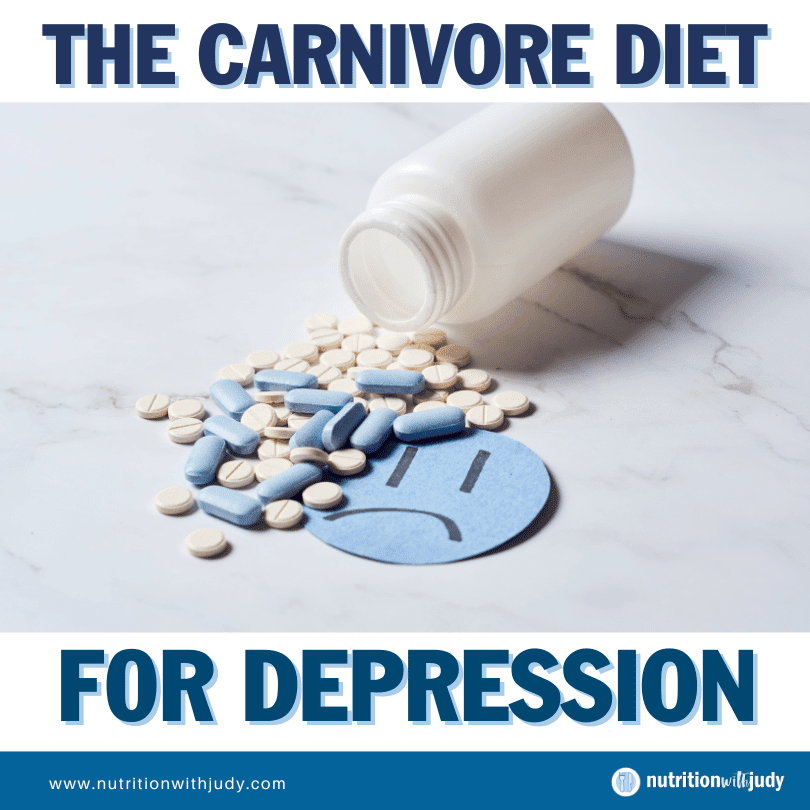

The Carnivore Diet for Depression


Mental health issues have become more and more prevalent in recent years which has been exacerbated by the pandemic. While there seems to be a declining trend with approximately three in ten adults in 2023 reporting symptoms of depression and anxiety vs. four in ten adults back in 2021, troubling data is illuminating that young adults are more likely to be depressed.
A 2023 US Census Bureau survey reported that 49.9% of adults between 18-24 and 38% of adults between 25-49 reported depressive and/or anxiety symptoms. Even though older adults seem to be fairing slightly better, between 20%-30% of older adults state the same mental health issues. With selective serotonin reuptake inhibitors (SSRI) prescriptions increasing by 35.2% and other antidepressant drug prescriptions increasing by 63.3% in six years, it begs the question— do antidepressant drugs really work?
With depression being one of these conditions so close to our hearts, we will always advocate for root-cause healing. And while the following powerful modality may not always offer root-cause healing, we’ve seen incredible success and essential support for a wide array of mental health issues. The carnivore diet for depression is backed by recent scientific data in addition to our clinical practice and countless anecdotal accounts.
Let’s explore some of the root causes of depression, exactly why the carnivore diet can be so effective for this common mental health condition, and some incredible carnivore diet depression success stories.
What Is Depression?
Depression is a mood disorder characterized by persistent feelings of sadness and apathy for activities and things that used to be enjoyed. According to the American Psychiatric Association’s Diagnostic and Statistical Manual of Mental Disorders (DSM-5), there are 9 different types of depressive disorders.
The symptoms of depression can range from mild to severe, and generally include:
- Persistent sadness, hopelessness, or worry
- No longer enjoying things that used to be joyful
- Becoming easily frustrated or irritated
- Weight gain or weight loss from changing eating habits
- Fatigue or low-energy
- Difficulties with making decisions, concentrating, or recalling things
- Physical symptoms such as headaches and GI issues
- Experiencing suicidal ideation
What Causes Depression?
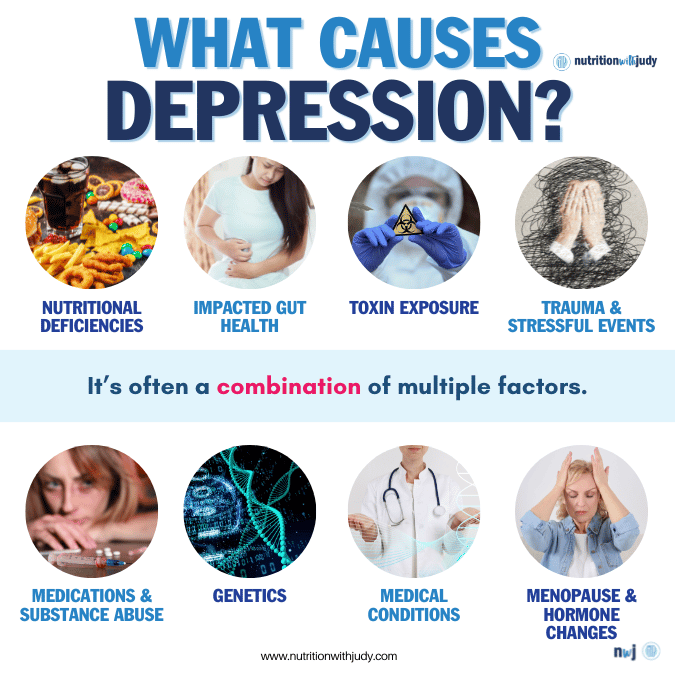

There are many factors that can cause depression. It’s often a combination of multiple factors, such as:
- Nutritional deficiencies: A commonly overlooked factor of depression is nutritional deficiencies. Research shows that there are many essential nutrients required to support optimal mental health. We’ll get more in-depth about these required nutrients for preventing and supporting depression later on.
- Impacted gut health: Due to the gut-brain axis, which we’ll explore more later on, impacted gut health can lead to the development of depression. Conditions such as leaky gut and irritable bowel disease (IBD) have been directly linked to depressive disorders.
- Toxin exposure: The modern world is filled with various toxins that have been associated with depression. Toxins such as bisphenol A (BPA), glyphosate, and mold can increase the risk of developing depression or exacerbate existing depressive disorders.
- Trauma and stressful events: Trauma and stressful life events such as divorce, death of a loved one, and isolation are common triggers for depression. Adverse Childhood Experiences (ACEs) can have a profound impact on this— negative experiences in childhood and teenage years are believed to put children at risk for chronic health problems, substance abuse, and mental illness such as depression. In the ACE questionnaire, a higher score indicates a higher risk of developing these issues later on in life.
- Medications and substance abuse: Certain medications and substance abuse can either cause depression as a side effect or exacerbate existing depressive conditions.
- Genetics: The likelihood of developing depression is two to three times greater for those with a parent or sibling with depression. However, it’s important to remember that while genetics can increase your likelihood, genetics aren’t destiny— other factors are often at play here as well.
- Medical conditions: Chronic conditions such as diabetes and chronic pain can cause depression as a side effect.
- Menopause and hormonal changes: Menopause and fluctuations with estrogen can trigger depression in women. Low testosterone has also been linked to depression in men.
Doesn’t Brain Chemistry Play a Role In Depression?
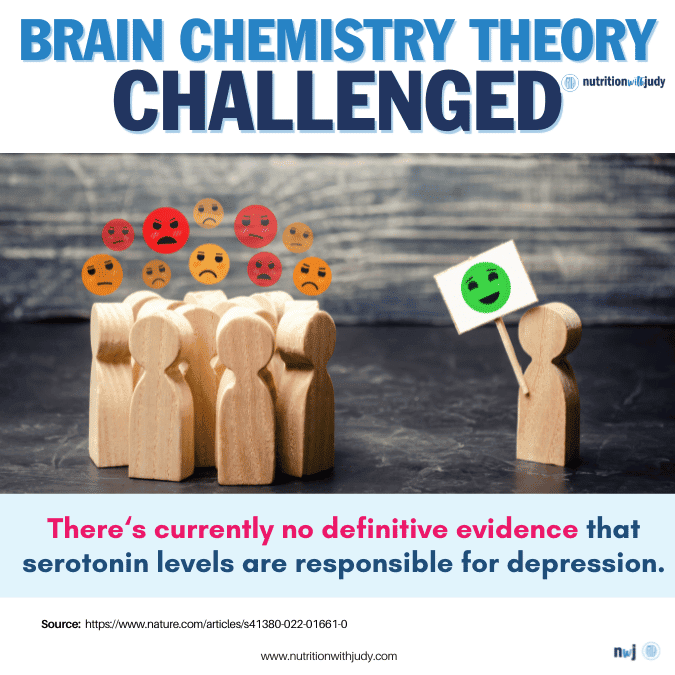

One of the leading theories behind depression is imbalanced brain chemistry. This theory makes the argument that an imbalance of neurotransmitters such as serotonin plays a significant role in developing depression.
This hypothesis is often used to justify the need for prescribing antidepressants, specifically selective serotonin reuptake inhibitors (SSRIs). However, a new umbrella review has challenged this theory, revealing that serotonin levels or activity may not be the root cause of depression.
There currently is no definitive evidence supporting this theory even though SSRIs rely heavily on it and what’s even more troubling are all the adverse side effects of these drugs. Long-term use of SSRIs has been shown to deplete essential nutrients such as vitamin D, calcium, folate, melatonin, and others.
Since nutritional deficiencies can be one of the causes of depression, not to mention the laundry list of side effects associated with SSRIs, you can see the dangers and risks of using these prescription drugs.
Luckily, there is a much safer approach that can help those with depressive disorders. Especially when paired with proper therapy and limbic retraining, the carnivore diet for depression might just be the missing piece you’re looking for.
Pro-Tip: For comprehensive mind-body support and the tools you need to optimally support your mental health, we offer an exclusive Mind-Body Program designed by our holistic wellness team to help heal the gap for individuals needing effective strategies. Learn more about our group offerings here.
What Is the Carnivore Diet?
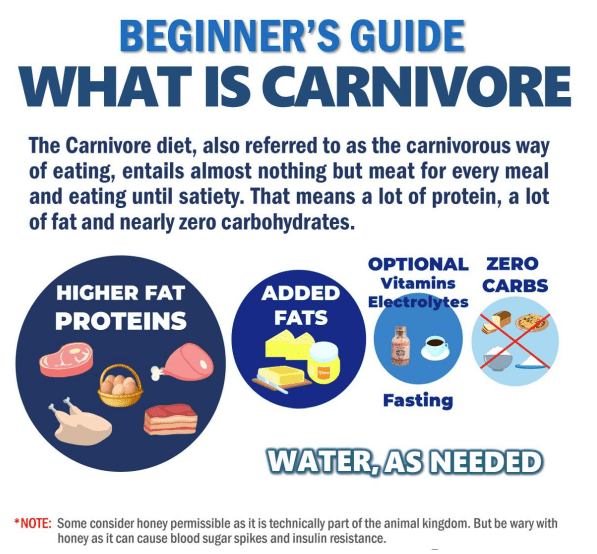

The carnivore diet, also known as Carnivore or the meat-based diet, consists of eating only animals and avoiding all plants and grains. Unlike ketogenic and other low-carb diets, the carnivore diet is a true zero-carb or nearly zero-carb way of eating that focuses solely on animal proteins and fats.
There are many different modified carnivore diets to choose from, which individuals choose based on their personal preferences and specific goals. The carnivore diet acts as the ultimate elimination diet, helping you discover exactly what foods are triggering your mental health symptoms.
It also helps illuminate if food isn’t your true root cause and supports deeper discoveries for root-cause healing such as Chronic Inflammatory Response Syndrome (CIRS). CIRS is an example of a root-cause illness that can cause depression.
The Carnivore Diet for Depression and Depressive Disorders
The carnivore diet can be an effective modality for depression and depressive disorders. While there needs to be more research completed to explain the definitive reasons why this dietary approach can be so compelling, current scientific data and our clinical practice both show significant therapeutic promise with the carnivore diet for depression.
One of the most important ways the carnivore diet can support depression is by delivering essential nutrients required for optimal mental health while supporting the gut-brain axis and eliminating any potential culprits that exacerbate depression.
How the Carnivore Diet Supports the Gut-Brain Axis
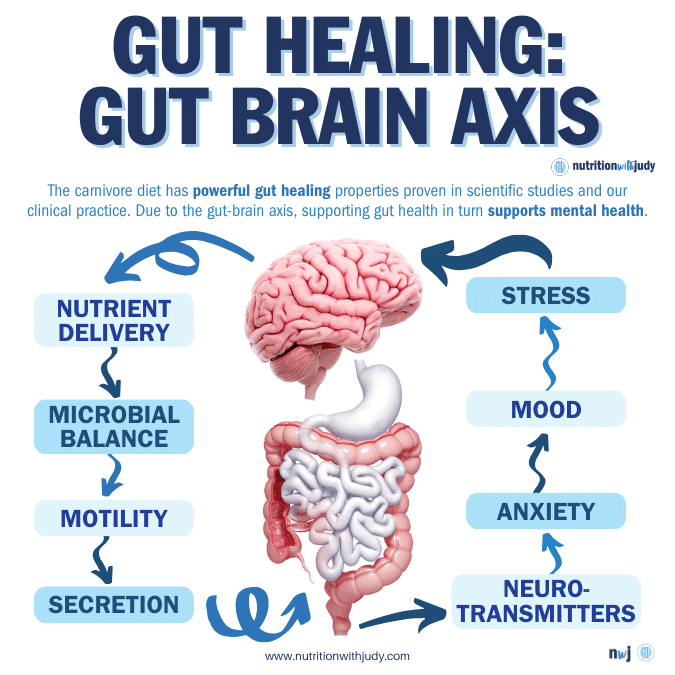

The gut-brain axis refers to the communication system between your gut and brain— they’re connected both physically and biochemically in many various ways. That’s why researchers believe they can both influence each other’s health.
The Gut-Brain Axis
Here’s a quick overview of how the two are connected:
- Vagus Nerve and the Nervous System: Neurons are a type of cell that are found in the central nervous system and brain that dictate your body’s behavior. There are about 100 billion neurons in the brain. The gut contains about 500 million neurons that are connected to the brain through nerves in the nervous system. One of the largest nerves connecting the gut to the brain is called the vagus nerve, which sends signals in both directions. One study found that individuals with IBD had reduced vagus nerve function. Research suggests that the vagus nerve is significant in the gut-brain axis, specifically in the role of stress.
- Neurotransmitters: Neurotransmitters are another chemical that connects your gut and brain. Within the brain, these are produced in order to control feelings and emotions. What’s interesting is that many of these neurotransmitters are also produced by your gut cells and the various microbes that make up your microbiome. 95% of the body’s serotonin is actually housed in the gut. Gut microbes also produce a neurotransmitter called gamma-aminobutyric acid (GABA) that helps control anxiety and fear.
- Other Gut Microbe Chemicals: Gut microbes also produce other chemicals that impact the brain. One of these chemicals is short-chain fatty acids (SCFAs) such as butyrate. For those of us not eating any fiber or dairy, don’t worry— bacteria also make butyrate from leftover cells and mucus. You can learn more about SCFAs here. SCFAs are essential for both gut and brain health. Lower levels of SCFAs have been linked with depression as well. Gut microbes are also responsible for metabolizing bile acids and amino acids in order to produce additional chemicals that impact the brain. Bile acids are chemicals created by the liver for absorbing dietary fats but are also believed to affect the brain. Animal studies show that stress and social disorders can reduce the production of bile acids by gut microbes, altering the genes involved in the production.
- The Immune System: Your gut-brain axis is also connected through the immune system. The gut along with gut microbes play a critical role in the immune system and inflammation by controlling exactly what’s passed into the body and what’s then excreted. If the immune system is activated for too long, it can lead to chronic inflammation which has been associated with different brain conditions such as depression and Alzheimer’s.
The Benefits of the Carnivore Diet for the Gut-Brain Axis
One of the most crucial applications of the carnivore diet is for gut healing and optimizing gut health. You can read more in-depth about all the various ways carnivore benefits the gut here.
By removing food triggers that contribute to leaky gut, providing nutrient-dense foods that power neurotransmitters and other vital chemical productions, and reducing the inflammatory load from other foods, you can see how the carnivore diet benefits the gut-brain axis.
Essential Carnivore Diet Nutrients for Depression
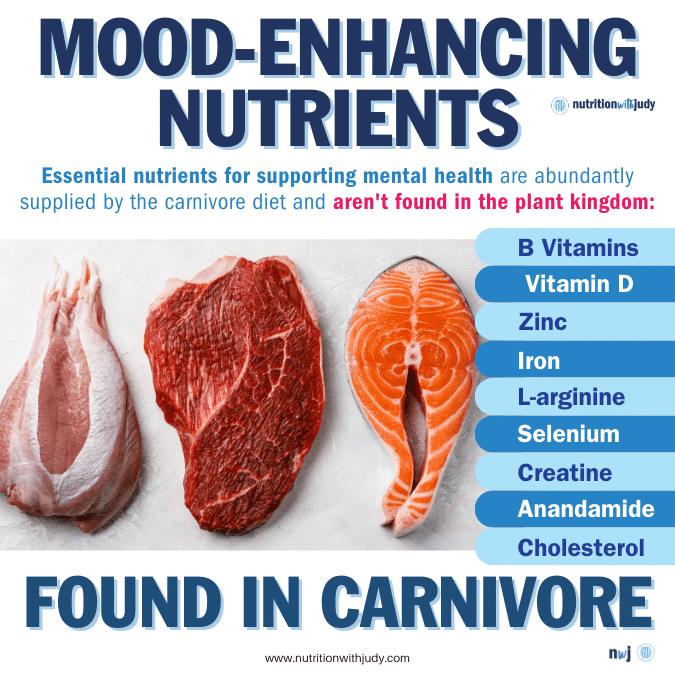

In addition to supporting the gut-brain axis, the carnivore diet plays a crucial role in nutrients while minimizing toxins that can exacerbate depression. Eliminating potential culprits such as gluten, aflatoxins, and lectins is also linked to helping support depressive disorders. The carnivore diet is also significantly lower in glyphosate exposure than any other diet, which is also believed to contribute to depression.
Circling back to nutrient deficiencies that can cause depression, let’s take a closer look at the essential nutrients needed for supporting mental health. Interestingly, these required nutrients are abundantly supplied by the carnivore diet and aren’t found in the plant kingdom.
- Cholesterol
- B vitamins
- Vitamin D
- Iron
- Zinc
- L-arginine
- Selenium
- Creatine
- Anandamide
Cholesterol
Several studies show that depression and suicide are associated with low cholesterol. Even though standard care has demonized cholesterol for so long, the reality is that cholesterol is an essential precursor for many physiological functions including molecules that directly and indirectly impact our moods and brain function.
In fact, the brain is the most cholesterol-rich organ in the body, containing almost 25% of the total amount. Low cholesterol may cause depression by altering brain chemistry, suppressing the production of serotonin, reducing the synthesis of all steroid and sex hormones, as well as reducing the synthesis of vitamin D. Hormone imbalances and low vitamin D are directly associated with depression.
Some food for thought: A 2008 study reported that 14-week-old breastfed babies had an average cholesterol of 204 mg/dL. They’d be recommended statins based on standard care definitions of high cholesterol.
The carnivore diet is rich in cholesterol, ensuring healthy levels for optimal wellness and mental health support.
B Vitamins
B vitamins are abundantly found in carnivore diet foods. They are also critical for supporting depression and mental health. Vitamin B12 is not in any plant-based foods. Low levels of B-12 and other B vitamins have also been linked to depression. One study found that B12 supplementation could prevent onset and improve depression.
Animal foods are the best bioavailable source of B vitamins. Certain B vitamins such as folate may be found in small quantities in some plant foods but often aren’t well absorbed due to plant anti-nutrients and are a package deal with glyphosate or other herbicide exposure.
When it comes to supplements, be aware of non-methylated versions if you have MTHFR gene variants as well as a specific form of B12 called cyanocobalamin which is derived from cyanide. Animal foods will always be the safest source of B vitamins.
Vitamin D
Seafood and red meat actually contain small amounts of dietary vitamin D. Evidence confirms that vitamin D levels play a role in depression. The exact mechanism is unknown, but the homeostatic, immunomodulatory, and neuroprotective effects of vitamin D could be involved.
A review from the December 2022 issue of Current Nutrition Reports shows low concentration of vitamin D is linked to increased symptoms of anxiety and depression. By supplying the body with vitamin D, a carnivore diet can help support depression.
Iron
Meat consumption enriches the body with bioavailable heme iron, a mineral that is essential for blood production. Iron is necessary for optimal mental health, too. You can learn more about the importance of heme iron here.
A database analysis from the May 2020 issue of BMC Psychiatry showed iron deficiency is connected to an elevated risk of anxiety disorders, depression, psychotic disorders, and sleep disorders. Healthy levels of iron could reduce the risk of mental disorders, such as depression, or their symptoms. The impact of iron on mental health stems from its role in the production of blood. Low iron levels mean that lower oxygen levels reach the cells thereby preventing them from working properly. Your brain needs iron to function properly. Reduced levels of this mineral affect processes in the brain including psychological well-being.
Zinc
Red meat is a wonderful source of the mineral zinc, which supports numerous functions including immunity, cell health, and brain functions. Zinc also plays a role in mood. Reduced levels of this mineral are associated with depression. Due to the prevalence of the gut-brain axis, we also need zinc to produce hydrochloric acid (HCl), also known as our stomach acid, in order to help break down our food to assimilate nutrients in the small intestine. Without proper HCl, which is partially derived from zinc, proper digestion is impacted, contributing to leaky gut and other mental health imbalances.
One factor in the relationship between zinc deficiency and depression involves the mineral’s action on the brain-derived neurotrophic factor (BDNF), a growth factor that participates in neurogenesis and differentiation. Zinc interacts with BDNF, and its deficiency lowers neurogenesis, thus paving the way to symptoms of depression. Zinc isn’t just associated with depression. Low levels of zinc in the body are linked to anxiety as well.
L-Arginine
A carnivore diet is abundant in l-arginine, an amino acid primarily necessary for circulation. This amino acid exhibits anti-stress effects, manages depression, and improves cognition. L-arginine reduces oxidative damage and increases mitochondrial functions in the brain. The body needs l-arginine to produce nitric oxide. Nitric oxide is a chemical that dilates blood vessels to improve blood circulation. It helps people feel and think better.
Selenium
Selenium supplementation has been reported to significantly decrease depressive symptoms. Research is also illuminating that low selenium levels are associated with developing depression as well. Luckily, selenium is abundantly found in seafood, muscle meats, and eggs.
Creatine
Creatine supplementation is also being explored for its therapeutic role in treating depression. Similar to the rest of these nutrients, creatine deficiency is believed to be associated with depressive disorders as well. The best natural food sources for creatine are red meat, poultry, fish, and some dairy.
Anandamide
Anandamide is an endocannabinoid that plays a role in mood regulation. It’s actually the first endocannabinoid that was discovered, is part of the body’s endocannabinoid system, and is known as the joy or bliss molecule. The endocannabinoid system is a biochemical communicative network that regulates many physiological functions within the body.
Anandamide is also being targeted for research as a therapeutic for depression. Plant foods such as chocolate have very small amounts of naturally occurring anandamide. While plant cannabinoids can interact with our body’s endocannabinoid system, this exact mechanism and capabilities are still being researched.
One of the best ways to boost your anandamide and other endocannabinoid levels is by eating healthy amounts of omega-3 and 6 fatty acids. These are precursors that our bodies use to produce endocannabinoids and are found in nutrient-dense seafood, poultry, and pork. If you’re worried about consuming omega-6 because of polyunsaturated fatty acids (PUFA) in the context of meat, we’ve debunked that here.
Exercise and physical touch are also additional ways to improve your anandamide levels— positive physical touch produces oxytocin which stimulates the production of anandamide.
Scientific Studies for the Carnivore Diet and Depression
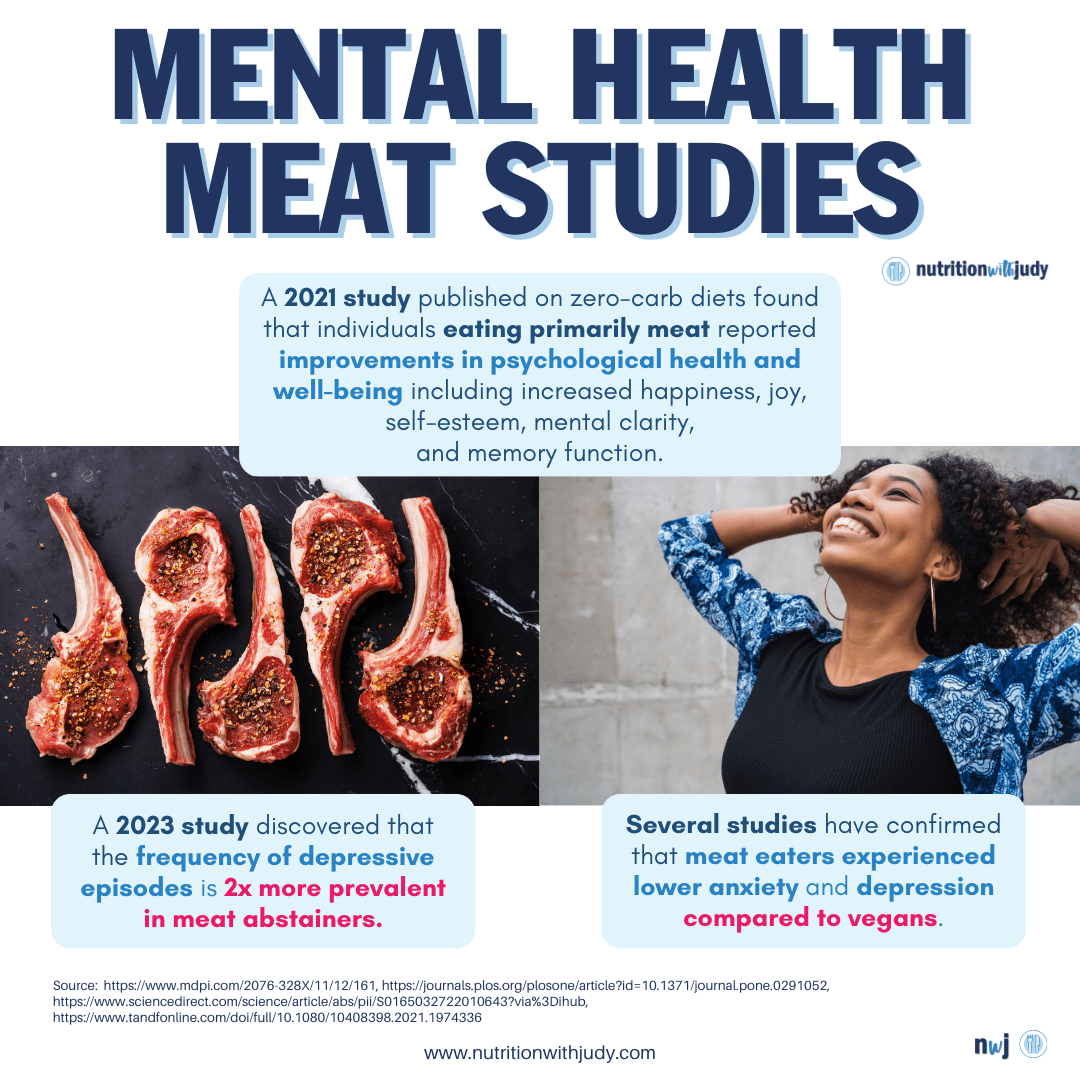

While there currently isn’t literature specifically on the carnivore diet for depression, there are many studies that focus on meat consumption and depression and other mood disorders.
Here’s an overview of the findings reported in these studies:
- Meat and mental health: The systematic review examined 20 different studies representing 171,802 participants and found that in addition to lower depression rates, meat intake was associated with reduced anxiety. Researchers confirmed that compared to vegans, meat eaters experienced lower anxiety and depression, regardless of gender. Interestingly, the more rigorous the study, the clearer the link between meat intake and better mental health.
- Meat and psychological health: In 2021, the same journal published a systematic review on a similar subject. The main objective was to evaluate the relationship between the avoidance or consumption of meat and psychological health and well-being. The review analyzed 18 studies with a total of 160,257 subjects of whom 149,559 were meat eaters and 8584 meat abstainers. Results showed that most studies, especially high-quality research, confirmed that avoidance of meat was linked to significantly higher rates of depression, anxiety, and self-harm behaviors. That’s why the review couldn’t support the idea of improving mental health through avoidance of meat.
- Meatless diet and depressive episodes: The randomized controlled trial from 2023 found that anxiety levels were lower in subjects who increased meat consumption. The main goal of the study was to examine the effects of disclosing genetic information on levels of anxiety or depression. The study also investigated the link between these psychological factors and diet. Researchers enrolled 100 healthy adults randomized to two groups. Male subjects experienced significant changes in dietary factors and psychological health. Participants who perceived their anxiety risk low showed a notable increase in protein consumption at three months compared to baseline. They also had lower levels of anxiety.
- Zero-carb diet survey: The study focused on the beliefs and experiences of people who followed a zero-carb diet. Participants whose diet consisted primarily of meat reported improvements in psychological health and well-being. Their mood and cognition improved with meat intake. The presence of depression, anxiety, and tiredness was reduced. People with a zero-carb diet reported increased happiness, joy, self-esteem, mental clarity, and memory function.
Stay tuned as our team is working hard to release peer-reviewed scientific literature on the carnivore diet and its various applications.
Carnivore Diet for Depression Success Stories
There are many incredible success stories when it comes to the carnivore diet for depression. Now that you’ve learned the science behind this powerful tool, here are some inspirational stories of people who have overcome their depressive disorders.
My Success Story
I had the pleasure of sitting down with Josh Snyman for his podcast. We chatted about a lot of my journey on the carnivore diet and how it healed my depression and an eating disorder. My experience is what compelled me to open this practice and write books to help those struggling in our communities.
Brett Lloyd’s Success Story
Brett has been on the carnivore diet for over 2000+ days now. He overcame 40+ years of depression and mental illness symptoms with this way of eating and helps others through a weekly mental health group and weekly addition group coaching on Revero.
Closing Thoughts On the Carnivore Diet for Depression
If the brain chemistry hypothesis behind depression is true, then eating a meat-based diet is the ideal alternative to SSRIs as it provides the nutrients needed for neurotransmitter production. For those who are slowly tapering off SSRIs, eating a carnivore diet is also a great way to help support the body and replenish all the nutrients depleted by these medications.
While this can be a very effective approach for healing depression, it’s important to consider therapy, limbic retraining, and other mind-body supports as a part of your comprehensive treatment protocol. These tools often go hand-in-hand, offering the best results for optimal mental wellness.
For individuals who have been on a carnivore diet for about six months and are still experiencing depression symptoms or depressive episodes, we recommend looking into deeper root causes such as toxins and the environment. Carnivore can be powerful and heal many things but the reality is that it doesn’t heal everything.
That’s why we created our Mind-Body Program in tandem with our comprehensive nutritional support in order to help our clients heal holistically. This exclusive program provides all the tools you need for achieving mind-body healing.
Work With Our Trusted Carnivore Diet Functional Nutritional Therapy Practitioners
The Nutrition with Judy practice is honored to be a trusted carnivore diet practitioner support serving clients from around the globe. We’re passionate about helping our clients achieve root-cause healing in order to lead the best quality of life possible that’s nearly symptom-free. Our team is dedicated to educating our community about the incredible benefits of the carnivore diet. We welcome you to explore our free resources and are always available to support you through personalized protocols. Our Symptom Burden Assessment (SBA) is the perfect starting point for discovering your root cause and is required to work with our team— you can learn more in-depth about this powerful tool here.
Start your root-cause healing journey today and contact us any time with any questions or concerns.
DISCLAIMER: This content is for educational purposes only. While we are board-certified in holistic nutrition and are nutritional therapy practitioners, we are not providing medical advice. Whenever you start a new diet or protocol, always consult with your trusted practitioner first.





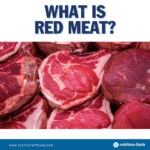
Craig Toni
February 4, 2024 at 9:32 amAnother great article, Judy. Very informative with the research information as well. Thank you for this information.